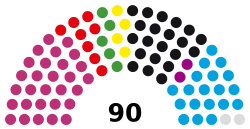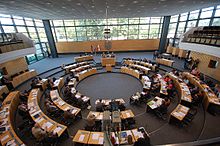Landtag of Thuringia
Appearance
You can help expand this article with text translated from the corresponding article in German. (September 2013) Click [show] for important translation instructions.
|
This article needs additional citations for verification. (February 2013) |
Landtag of Thuringia Thüringer Landtag | |
|---|---|
 | |
| Type | |
| Type | |
| Established | 1920 |
| Leadership | |
President | |
| Structure | |
| Seats | 90 |
 | |
Political groups | Government (42)
Opposition (48) |
| Elections | |
Last election | 27 October 2019 |
Next election | 1 September 2024[1] |
| Meeting place | |
 | |
| Landtag of Thuringia, Erfurt | |
| Website | |
| www.thueringer-landtag.de | |
The Landtag of Thuringia is the
Minister-President
and control the government of Thuringia.
Elections

Elections are held every five years using the German
election threshold of 5% vote share to receive any seats. All German citizens 18 years of age or older living in Thuringia are entitled to vote. If a party wins more constituency seats than its overall share of the vote, the overall size of the Landtag increases because of these overhang and leveling
mandates.
Current composition
As of the elections of 27 October 2019, The Left is the largest party.
| Party | Seats | Group leader | |
|---|---|---|---|
| The Left (Linke) | 29 / 90 |
Steffen Dittes | |
| Alternative for Germany (AfD) | 22 / 90 |
Björn Höcke | |
| Christian Democratic Union (CDU) | 21 / 90 |
Mario Voigt | |
| Social Democratic Party (SPD) | 8 / 90 |
Matthias Hey | |
| Alliance 90/The Greens (Grüne) | 5 / 90 |
Astrid Rothe-Beinlich | |
| Free Democratic Party (FDP) | 5 / 90 |
Thomas Kemmerich | |
Historical Composition
-
1st Landtag.
-
2nd Landtag.
-
3rd Landtag.
-
4th Landtag.
-
5th Landtag.
-
6th Landtag.
-
7th Landtag.
History

The Landtag of the newly established Free State of Thuringia (Freistaat Thüringen) first convened in 1920 in
Nazi seizure of power in Berlin, the Landtag was abolished in the Gleichschaltung process by the "Law on the Reconstruction of the Reich" of 30 January 1934.[4]
After
.The State of Thuringia was restored during Germany's reunification and Landtag elections were again held on 14 October 1990.
Notes
- minister-president candidate, Bodo Ramelow.
See also
- List of presidents of the Landtag of Thuringia
- 2004 Thuringia state election
- 2009 Thuringia state election
- 2014 Thuringian state election
- 2019 Thuringian state election
References
- ^ Mitteldeutscher Rundfunk, ed. (5 September 2023). "Neuer Landtag wird am 1. September 2024 gewählt". Retrieved 12 November 2023.
- ^ Thüringer Landtag (ed.). "Seat allocation of the Thuringian State Parliament". Retrieved 12 November 2023.
- ^ Mitteldeutscher Rundfunk, ed. (22 December 2022). "Landtag löst Gruppe "Bürger für Thüringen" einstimmig auf". Retrieved 12 November 2023.
- ^ "Law on the Reconstruction of the Reich". Retrieved 26 February 2023.







